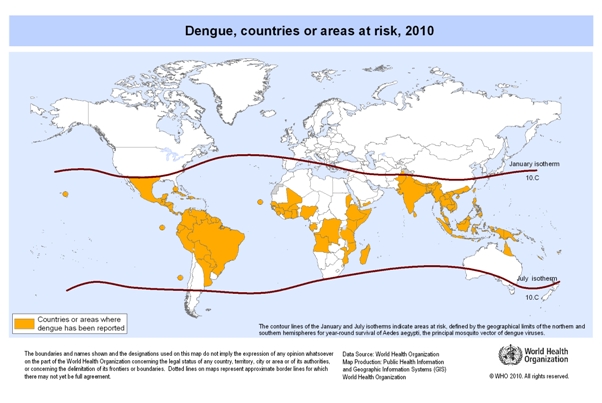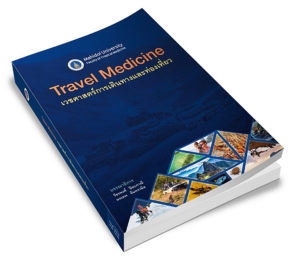Generally, in our travel clinic, when we give some advices about malaria; we will try to add something about dengue also. Since, in fact, the risk for travelers to get dengue while traveling in Southeast Asia is far greater than malaria. However, not surprisingly, dengue infection is less known to travelers when compared to malaria.
Let’s start with some basic, yet important, information about dengue.
1. Dengue is a mosquito borne disease. It exists in many countries in tropical/subtropical area including in Asia, Africa, Central and South America. See the map from World Health Organization (WHO) below. Among these areas, Southeast Asia is considered to be the most important risky area for travelers.
2.Main mosquito species that transmits dengue is called Aedes aegypti. They exist in both rural and urban area throughout Southeast Asia including major cities such as Bangkok, Singapore.
3. You may get dengue infection if you are bitten by an infected mosquito with dengue virus. The usual incubation period (time between bitten until symptoms develop) is around 3-7 days.
4. Dengue infection has a wide of clinical spectrum, ranging from asymptomatic infection, to fatal disease. Fortunately, most dengue infections are mild or even asymptomatic infection. Small percentage of patients may be severe such as develop bleeding, hence named dengue hemorrhagic fever, and may leading to shock and death.
5. So that’s mean, even you are bitten by an infected mosquito that carries dengue virus, you have a high chance to be fine or develop such a mild fever, especially if that is your first exposure to dengue virus (primary dengue infection). It is unlikely that you will be critically ill.
6. Most common symptoms of dengue infection are fever, headache, muscle pain, bone pain, rash, nausea and vomiting. Fever in dengue infection is usually high and persistent, lasting for 2-7 days. Severe manifestation such as bleeding and shock may occur in some cases especially when fever start to decline.
7. Dengue is a self-limited disease. Most patients with dengue will recover spontaneously. Only few percent of patients will require hospitalization. However, we have to consider dengue infection as a serious disease. Whenever you develop symptoms that resemble to dengue infection as describe above, you should seek for medical care.
Those are some important basic information about dengue, we’ll discuss further on the risk and how to prevent dengue in travelers in the next article.


